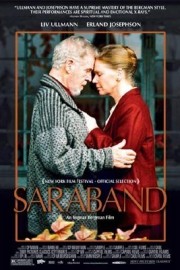Saraband
This is my first review of Ingmar Bergman, the Swedish master who made some of the most distinguished and profoundly important films of the 20th Century. This is my fifth experience with Bergman. In 1997 I sought out his 1966 film “Persona”- about an actress who doesn’t speak and the nurse who cares for her- after it was mentioned in a review of- get this- “Face/Off.” I was impressed. In 2001, one of the first films I got through Netflix was his most famous film, 1957’s “The Seventh Seal,” about a knight of the Crusades on his way home, playing a chess game with Death. I thought that was literally what it was about, and though I look at it favorably, I didn’t see the greatness in it. Last year, I watched Bergman’s visually-bold, thematically intriguing “Hour of the Wolf,” a study in dream logic starring Max Von Sydow and Liv Ullmann (Bergman’s lover/partner for many years). I almost reviewed it for Sonic Cinema, but words escaped me (perhaps in the future you’ll see a review).
And shortly before seeing “Saraband”- which is Bergman’s first film since his original swan song (1984’s “Fanny and Alexander”), and now looking like his last film- I saw 1973’s great “Scenes From a Marriage,” which starred Ullmann and Erland Josephson (whom I had known from Andrei Tarkovsky’s last two films, “Nostalghia” and “The Sacrifice”) as a couple whose marriage deteriorates over the span of several years. “Saraband” is the continuation of that story after 30 years, with Ullmann’s Marianne visiting Josephson’s Johan at his house in the country, where he lives close to his son Henrik (which he didn’t have with Marianne) and his grand-daughter Karin. Henrik- a former cellist/orchestra conductor- is his daughter’s cello teacher, who challenges her to be a solo performer with difficult pieces. But she wants other things, yet after the death of her mother Anna, she can’t break away from her possessive father. After having endured their family being destroyed from the inside out, Johan and Marianne are now witnesses to it, and helpless- either by choice or by action- to stop it.
Bergman’s style has not been the easiest to get into over the years, but I’m easing my way into it (having seen excellent examples of it in “Wolf” and “Marriage”- where the style is so correct for the material- is a benefit; I plan on revisiting “Seal” and “Persona” in the future); my experiences with Tarkovsky’s films- which I value most on a personal/artistic level- is a plus. “Saraband” is a bit different from the earlier films in that the shooting and editing style feels more contemporary than it does classic Bergman. No matter; the Bergman staples- the layers of emotions, the asking of life’s “big” questions, the thematic depth inherent within the story’s simple structure- are all here in a richly acted and deeply rewarding motion picture that stands as a tribute to its’ maker, and his remarkable- and remarkably personal- career. If it is true that this is the end for Bergman (and I believe that it is), I say thank you for sharing your life journey with us. We fans of world cinema will never forget it…even if some of us are coming in at the end of it.










